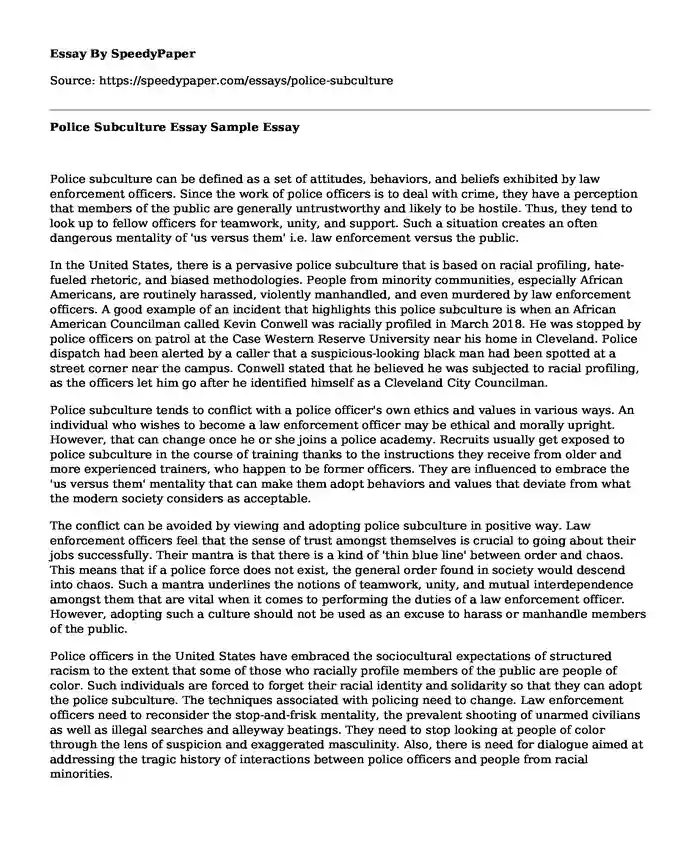Police subculture can be defined as a set of attitudes, behaviors, and beliefs exhibited by law enforcement officers. Since the work of police officers is to deal with crime, they have a perception that members of the public are generally untrustworthy and likely to be hostile. Thus, they tend to look up to fellow officers for teamwork, unity, and support. Such a situation creates an often dangerous mentality of 'us versus them' i.e. law enforcement versus the public.
In the United States, there is a pervasive police subculture that is based on racial profiling, hate-fueled rhetoric, and biased methodologies. People from minority communities, especially African Americans, are routinely harassed, violently manhandled, and even murdered by law enforcement officers. A good example of an incident that highlights this police subculture is when an African American Councilman called Kevin Conwell was racially profiled in March 2018. He was stopped by police officers on patrol at the Case Western Reserve University near his home in Cleveland. Police dispatch had been alerted by a caller that a suspicious-looking black man had been spotted at a street corner near the campus. Conwell stated that he believed he was subjected to racial profiling, as the officers let him go after he identified himself as a Cleveland City Councilman.
Police subculture tends to conflict with a police officer's own ethics and values in various ways. An individual who wishes to become a law enforcement officer may be ethical and morally upright. However, that can change once he or she joins a police academy. Recruits usually get exposed to police subculture in the course of training thanks to the instructions they receive from older and more experienced trainers, who happen to be former officers. They are influenced to embrace the 'us versus them' mentality that can make them adopt behaviors and values that deviate from what the modern society considers as acceptable.
The conflict can be avoided by viewing and adopting police subculture in positive way. Law enforcement officers feel that the sense of trust amongst themselves is crucial to going about their jobs successfully. Their mantra is that there is a kind of 'thin blue line' between order and chaos. This means that if a police force does not exist, the general order found in society would descend into chaos. Such a mantra underlines the notions of teamwork, unity, and mutual interdependence amongst them that are vital when it comes to performing the duties of a law enforcement officer. However, adopting such a culture should not be used as an excuse to harass or manhandle members of the public.
Police officers in the United States have embraced the sociocultural expectations of structured racism to the extent that some of those who racially profile members of the public are people of color. Such individuals are forced to forget their racial identity and solidarity so that they can adopt the police subculture. The techniques associated with policing need to change. Law enforcement officers need to reconsider the stop-and-frisk mentality, the prevalent shooting of unarmed civilians as well as illegal searches and alleyway beatings. They need to stop looking at people of color through the lens of suspicion and exaggerated masculinity. Also, there is need for dialogue aimed at addressing the tragic history of interactions between police officers and people from racial minorities.
References
Ganapathy, N., & Cheong, H. (2016). The "thinning" blueline: a Bourdieuian appreciation of police subculture. International Journal of Comparative and Applied Criminal Justice, 40(4), 325-342.
Rose, T., & Unnithan, P. (2015). In or out of the group? Police subculture and occupational stress. Policing: An International Journal of Police Strategies & Management, 38(2), 279-294.
Cite this page
Police Subculture Essay Sample. (2022, Nov 07). Retrieved from https://speedypaper.com/essays/police-subculture
Request Removal
If you are the original author of this essay and no longer wish to have it published on the SpeedyPaper website, please click below to request its removal:
- Lean on Me - Essay Example on Movie Critique
- Essay Sample on the Impact of Technology
- Creating Anglo-America - Free Essay in American History
- Free Essay Example on Information Technology Privacy
- Compare and Contrast Essay on Cameroon and Stokeling Cases
- Fictional Characters: Exploring World Perspectives in Crime Films, TV & Video Games - Essay Sample
- Proper Tagging and Labelling Evidence - Free Essay
Popular categories





